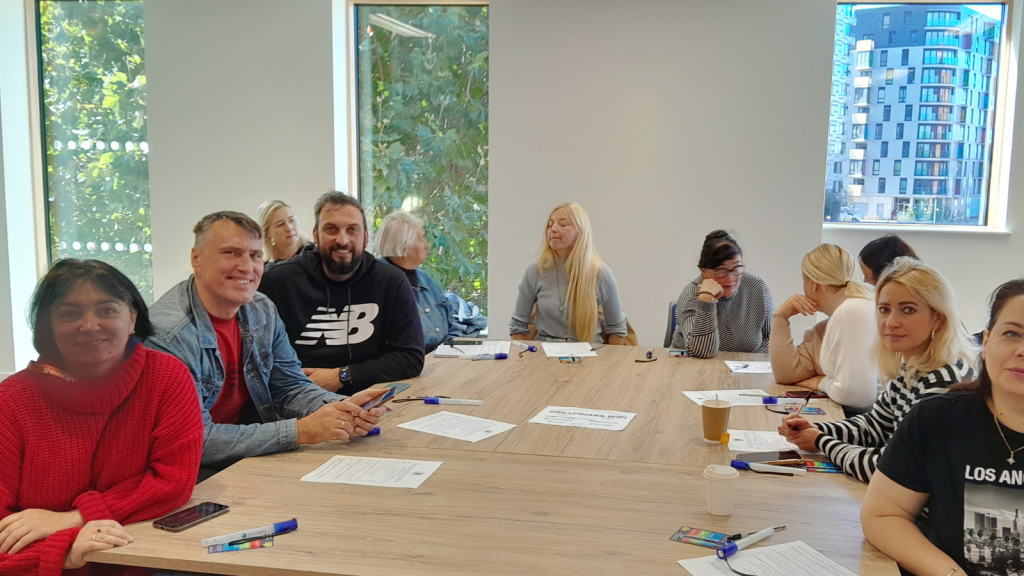Helping refugees to understand energy use in the UK
June 2024

On World Refugee Day, our Project Development Manager, Bethany Steer considers the ways that our Empowered by Energy project has helped refugees and asylum seekers adjust to life in the UK.
Our Empowered by Energy project delivers advice sessions targeted towards new arrivals to the UK. Refugees face additional issues. They may not have a good understanding of English, the energy systems in their home country may be very different and they may not be used to using heating regularly if they are used to a warmer climate than the UK has. They may not know how to keep a home warm, read their energy meter, set up a fuel account or bleed radiators.
We may not know the situations refugees faced that caused them to leave their home for the safety of the UK. Whether we do or not we know that most have faced difficulties that are unimaginable to most people. Despite these circumstances, we’ve found the sessions we run can become positive places for them. They provide an opportunity not only to learn new systems but also to meet other people who have similar experiences, form friendships and learn how to save money at the same time.
Without such support, refugees and asylum seekers can quickly find themselves owing hundreds of pounds to an energy supplier they didn’t know about.
The workshops give them the confidence to contact their energy company, get the support they need and have a better oversight of their energy bills. We always help them access the Priority Services Register too. This can be an invaluable service as it’s designed to help vulnerable customers, including offering a translation service. The group sessions usually run over three different days giving attendees the time to digest the information.
The sessions cover:
Workshop 1
- Explaining why we need to keep warm to keep healthy
- Who is affected by cold homes
- What are condensation and damp
- Carbon monoxide awareness
- Working out how to keep our homes warm and reduce heat loss
- Interactive game to consider how to save energy and save money
Workshop 2
- Managing energy bills
- Energy tips in the kitchen
- Methods of cooking
- Appliances and their costs
- Types of heating
- Types of meters including smart meters
- Payment methods
Workshop 3
- Help available
- Energy support via national schemes
- Priority Services Register – District Network Operators/Gas Distribution Networks/Supplier and Water
- What to do in a power cut
- Warm Home Discount
- Trust funds
- Local support/assistance including support from water companies
- Cost of Living Support
- Our energy helpline freephone service
- Recite Me (translation via National Energy Action’s website) and Language Line Advice
Attendees receive a pack of energy-efficient items to enable them to save energy and money at home. Items can include a slow cooker or an air fryer, LED lightbulbs, radiator reflectors and a thermometer card. Attendees are encouraged to use these products themselves and to also share how they help to reduce energy costs with their friends and families.
One attendee said, ‘I just wanted to say thank you for your work: well-structured info, colourful slides and a knowledgeable speaker. The info might seem basic for some locals, but it gives you a general picture as well as some daily tips which is very needed, especially for refugees like us.’
100% of participants thought the experience of the workshops was very good or good.
- 68% said they will or have registered for the Priority Services Register.
- 87% of respondents stated that they will or have looked into taking action to control their heating system more effectively.
- 94% of respondents stated that they will or have changed how they use their appliances in their home to save energy.
We’ve been able to make strong partnerships with organisations that work with refugees in their local communities. A support worker from Bournemouth told us about the transformational work of the project.
‘Thank you for being available to give information and education to some of the youngsters who we support to get them thinking about and preparing them to understand how to manage energy when they move to a new home independently. They learned that they would be responsible for paying for the energy to heat, light and power their homes and were given good tips about how to organise this and how to save money. I have seen some of our youngsters using their slow cookers already and it was fantastic that they were able to go home with these and know how using them would save energy and money.’
We would like to thank SGN, and Scottish and Southern Electricity Networks for funding this vital work.
If you are interested in becoming a partner or for more information on the project, contact me by emailing bethany.steer@nea.org.uk.

